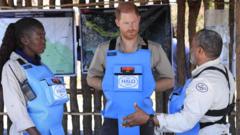What Caused a Wild 12-Person Brawl at McDonald's?

## Addressing Anti-Social Behaviour in Fast-Food Chains: A Closer Look at McDonald’s Incidents
The fast-food industry has become a staple in modern society, serving millions of customers globally every day. However, with the convenience of quick meals comes the challenge of maintaining a peaceful and respectful dining environment. Recent incidents involving anti-social behaviour at McDonald’s restaurants have raised concerns and highlighted the need for effective management strategies. This article delves into the recent events surrounding McDonald’s, exploring the implications of such behaviour, the company’s response, and broader societal issues that contribute to these disturbances.
### Understanding Anti-Social Behaviour in Restaurants
Anti-social behaviour encompasses a range of activities that cause harassment, alarm, or distress to individuals. In restaurant settings, this can manifest as loud disturbances, aggressive confrontations, vandalism, or any disruptive actions that negatively impact the dining experience for others.
**Types of Anti-Social Behaviour:**
1. **Verbal Aggression**: Shouting or using offensive language that disturbs other customers.
2. **Physical Altercations**: Fights or scuffles that lead to injuries or property damage.
3. **Vandalism**: Deliberate destruction of property, including furniture or fixtures.
4. **Disorderly Conduct**: Actions that disrupt the general order within the establishment.
### The McDonald’s Incident: A Case Study
Recently, a McDonald’s restaurant faced significant backlash after a group of customers exhibited anti-social behaviour, leading to their expulsion and police involvement. The incident, widely circulated on social media, resulted in a wave of negative online reviews, with many customers rating the establishment one star and expressing dissatisfaction with their experience.
#### Management’s Response
In response to the incident, McDonald’s issued a statement highlighting their zero-tolerance policy towards anti-social behaviour. They emphasized the following points:
- **Immediate Action**: The restaurant staff promptly asked the disruptive group to leave.
- **Police Cooperation**: The management called local law enforcement to handle the situation and ensure safety.
- **Reinforcement of Protocols**: The company is revisiting its de-escalation processes to better equip staff in handling similar situations in the future.
This response illustrates that McDonald’s takes such incidents seriously and is committed to providing a safe environment for all customers.
### The Impact of Negative Reviews
The digital age has transformed how consumers interact with businesses. Online reviews can significantly influence a restaurant's reputation. In the case of McDonald’s, the negative feedback stemming from the incident may lead to long-term consequences for the establishment, including:
1. **Decreased Customer Visits**: Potential customers often check reviews before visiting a restaurant. A spike in negative ratings can deter them from choosing that location.
2. **Loss of Revenue**: Fewer customers translate to lower sales, impacting the restaurant's financial health.
3. **Brand Image Damage**: Repeated negative incidents can tarnish the brand's reputation, leading to a general decline in consumer trust.
### Broader Context: Anti-Social Behaviour in Public Spaces
The incident at McDonald’s is not an isolated case. Across various public venues, including fast-food establishments, bars, and parks, anti-social behaviour has become an increasing concern. Factors contributing to such behaviour include:
- **Alcohol Consumption**: Many incidents occur in or around establishments that serve alcohol, leading to impaired judgement and aggression.
- **Social Media Influence**: The desire for viral content can encourage reckless behaviour, as individuals may act out for attention.
- **Economic Stress**: Financial hardships can lead to increased frustration and irritability, sometimes manifesting in public disruptions.
### Comparisons and Global Perspectives
Interestingly, McDonald’s is not alone in facing challenges with anti-social behaviour. A notable incident occurred in Canada, where a McDonald’s outlet was temporarily closed following a violent altercation that involved a raccoon as an unconventional weapon. This bizarre event, which gained international attention, underscores the unpredictable nature of public behaviour in fast-food restaurants.
### Strategies for Prevention and Management
To mitigate incidents of anti-social behaviour, restaurant chains can adopt several strategies:
1. **Staff Training**: Implement comprehensive training programs that equip employees with skills to handle disruptive situations effectively.
2. **Clear Policies**: Establish and communicate clear behaviour policies to customers, reinforcing that unacceptable behaviour will not be tolerated.
3. **Enhanced Security**: Consider employing security personnel during peak hours to deter potential disruptions.
4. **Community Engagement**: Foster positive relationships with local law enforcement to ensure swift response in case of disturbances.
5. **Use of Technology**: Utilize surveillance cameras to monitor activity within the restaurant, enhancing safety and accountability.
### Conclusion: The Importance of a Safe Dining Environment
The recent incidents at McDonald’s highlight a growing issue that requires urgent attention. As the fast-food industry continues to thrive, ensuring a safe and pleasant dining environment is paramount.
Companies must take proactive measures to prevent anti-social behaviour, support their staff, and maintain a positive reputation. In doing so, they can secure the trust and loyalty of their customers, contributing to long-term success in the competitive fast-food market.
As we reflect on these incidents, it invites us to consider: How can we as consumers contribute to creating a respectful and enjoyable dining experience?
#### FAQs
What constitutes anti-social behaviour in restaurants?
Anti-social behaviour in restaurants includes loud disturbances, aggressive confrontations, vandalism, and any disruptive actions that negatively impact other customers.How does anti-social behaviour affect a restaurant's reputation?
Negative incidents can lead to poor online reviews, decreased customer visits, and damage to the restaurant's overall brand image.What steps can fast-food chains take to mitigate anti-social behaviour?
Fast-food chains can implement staff training, establish clear behaviour policies, enhance security measures, engage with the community, and utilize technology for monitoring. As we continue to navigate dining in public spaces, understanding the dynamics of behaviour in restaurants becomes crucial. What measures do you think are most effective in fostering a positive dining atmosphere? #FastFood #RestaurantSafety #CustomerExperiencePublished: 2025-07-16 21:44:32 | Category: News



